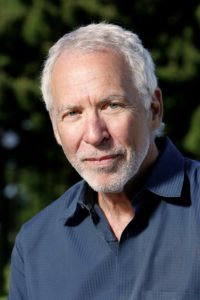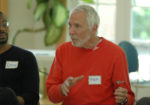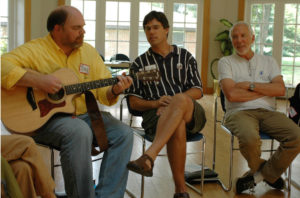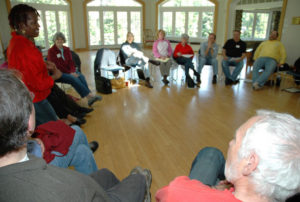Peter Block is a best-selling author and widely respected leader in the areas of organization development, community building and civic engagement. His books include Community: The Structure of Belonging; Stewardship: Choosing Service over Self-Interest; Flawless Consulting: A Guide to Getting Your Expertise Used; and The Answer to How is Yes. In 2010, he and John McKnight co-wrote The Abundant Community: Awakening the Power of Families and Neighborhoods, a book that continues to inspire and inform many community-building initiatives.
Peter is the recipient of numerous awards for his work, including the Organization Development Network’s Lifetime Achievement Award. He has also been recognized for his efforts to effect peace and reconciliation in the Northern Ireland Peace Process. In 1999, he and Werner Erhard developed The Ireland Initiative, working with clergy and grassroots leaders to develop new thinking and new conversations.
Peter and his wife live in Cincinnati, Ohio, and alongside other volunteers he recently founded a network called A Small Group, to foster the creation of restorative communities and to bring his work on civic engagement into being. Peter’s latest book, entitled An Other Kingdom: Departing the Consumer Culture (2016), was co-written with John McKnight and theologian Walter Brueggemann.
Bill Locke, Publisher of Kolbe Times, recently spoke with Peter Block about his life, his work, and his ideas for creating workplaces and communities that work for all.
First, here are a few audio highlights from that conversation, with original music by Peter Locke (8:35)
Bill Locke: Peter, thank you for taking time to talk with us today.
Peter Block: My pleasure. Thank you.
Bill Locke: I noticed in reading one of your books that you were deeply affected by your background, growing up in a Jewish family in Chicago, and having some very interesting family members around you, such as your aunts and uncles. Can you tell us what it was like, and how that community influenced your life.
Peter Block: Until I was fifteen I was so immersed in being a Jew that I didn’t even know I was a Jew, because there were no Gentiles around me. It was a very tight, inclusive world – even economically. You would only buy from your own extended family. As a child, there were too many of them. I thought, this is what it means to be young, I guess. It was loud; it was expressive. A couple of my uncles collected jokes for a living.
At the same time, you accommodate yourself to the dominant larger culture. The older I got, the more I left. I left home – I left Kansas City – I moved east to college and tried to get a job at home, and I kind of got assimilated like most Jews do. I struggled with my identity, but it’s the only thing I could count on. It’s the only thing I know. It’s the only thing that I haven’t made up or fictionalized. So I’m grateful for that. I’m disturbed about the state of Israel and the conditions today. I’m a lousy Jew. I felt that for a long time, because I didn’t go to Temple and I didn’t know the words or speak the language, that I’ve probably betrayed my heritage. But then I was in a Jubilee Forum that we run with Rabbi Miriam. She said if you’re Jewish, it comes through the blood of your mother. If your mother was Jewish, it’s said and done. It’s who you are, whether you’re disaffected, practicing, Conservative or Reform. And I took great comfort that I have a history that’s assured to me.
The other part of being a Jew is that you’re an outsider. I always had a story about myself – that I was gypsy; a wandering Jew. I would live in cities and leave them and not mind. For the first fifty some years of my life I took on the identity of someone who lives on the margins, doing marginal things, but not belonging anywhere. But something changed in the last fifteen years or so. I discovered that my story about myself was fictional – that I’d made it up. So I started to reconstruct the narrative about the question “Now what do I do in this world?”
But lately I’ve become a member of my community. Mostly I like it.
Bill Locke: You talk about being on the outside and being a nomad – sort of an “outlier” – do you think that contributed to your becoming a consultant for so many years?
Peter Block: Yes, absolutely. It contributed to everything – where I lived, how I lived, how I thought of my children. I just felt it was never in the cards for me to be normal, partly because my family was difficult. My father died when I was fourteen or fifteen and that was a loss I’ll never get over. And so I tried to live a “normal” life. I got married, had kids, a mortgage, a house, a job from 8:15 to 4:45. The longing was so deep that I would do anything to fit in and belong somewhere – but after a while I realized that it just wasn’t going to happen.
And then I started finding my own voice. My life began probably in my mid to late twenties.
Bill Locke: After a while you met John McKnight, and you started teaming up with others and focusing more on community. Can you tell us about that?
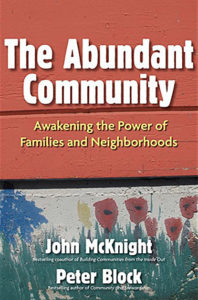 Peter Block: Well, I had admired John’s essays for a long time. I’d always been drawn to people who spoke clearly enough to change my mind and change my thinking. John was one of those people. He talked about community gift-mindedness. He was a beacon of light for me. And then a police chief, sometime in the 1980s, ran these community meetings once a year. He invited me to come give a talk. I went in there, and found out that the speaker after me was scheduled to be John McKnight! I didn’t even know he was going to be there. So I gave my talk from 9 to 10:15, and during the break that he came up to me and said, “Peter, I’m John McKnight.” And I said, “I know – how great is this!” And he said, “I’m due to go on after you. Want to do it together?” I said, “Absolutely!”
Peter Block: Well, I had admired John’s essays for a long time. I’d always been drawn to people who spoke clearly enough to change my mind and change my thinking. John was one of those people. He talked about community gift-mindedness. He was a beacon of light for me. And then a police chief, sometime in the 1980s, ran these community meetings once a year. He invited me to come give a talk. I went in there, and found out that the speaker after me was scheduled to be John McKnight! I didn’t even know he was going to be there. So I gave my talk from 9 to 10:15, and during the break that he came up to me and said, “Peter, I’m John McKnight.” And I said, “I know – how great is this!” And he said, “I’m due to go on after you. Want to do it together?” I said, “Absolutely!”
Because of our different ways of thinking and different ways of being, my friendship with him has become just indispensable. The way he thinks gave depth and texture to the little scribblings that I’ve been involved in. About that time I had decided that I had done enough with the corporate world.
I had been affected by a visit to the Philippines. I had met with the government and the cabinet who had just taken over from Marcos, and they really cared about the country. I could tell because when I worked with them, I would say, “Well, let’s break into small groups for thirty minutes and here’s what I want you to do.” Then I would blink and they were gone – and in thirty minutes they were back, and they’d done the assignment, however foolish it was. And I remember thinking, “I can’t really tell if what I’m doing in this world matters, but I want to be in same the room with people like this who are really into something and care about it.”
John taught me the power and politics of hospitality. As time goes on, of course, we’ve become more and more frightened of welcoming the stranger. So I think John’s work and our work, about belonging and community and hospitality, is more relevant and needed than ever.
Bill Locke: Can you describe the direction you think we’re going in North America, and why it’s important to reflect on it?
Peter Block: Well, I think we have a fictional account here in the U.S. about being a country that cares about freedom – religious freedom, property freedom, and so on. I think we’re now having to come to terms with the reality that we’ve always been a very individualized, privatized empire; an imperial culture. And we’re so rich that we think we earned it. We did go through periods of more generosity with a lot of our social services. But once we won the Second World War we had no competition, and we kind of got caught up in ourselves. So I feel this is a time of unmasked individualism, fear, pride of dominance, belief in the dollar and materialism. Now with a president who is a bully and has no shame, all that becomes legitimized. It’s terrifying to me. I think it’s economically driven, and we somehow have come to think that we have a right to keep growing, to be mobile, to make more money, to have more things, to control more territory, to pay less taxes. It’s a stage of adolescence, in a way. What’s frightening to me is that it’s so popular and unrestrained.
Bill Locke: At the same time there are people who are waking up to the fact that they have lived this consumeristic reality for a long time, and there are some pioneers like you and John McKnight who are painting a new kind of picture – a picture of abundance, like you talk about in The Abundant Community, as opposed to scarce community. What does the abundant community look like, in contrast?
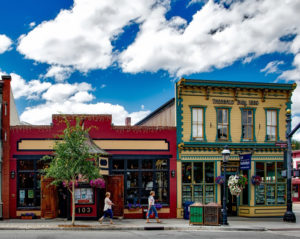 Peter Block: Well, it’s a life organized around walking distance. It’s a belief that without the strangers we’ll never be surprised. It’s an economy that’s simpler. You know, the economy used to be Saturday morning at the marketplace, instead of our main source of entertainment. I think the economy is fragile, and people are having to find their own way to make a living, with three jobs. And I think the structures are changing, as you document with many of the stories on your website. There’s a cooperative movement going on. Forty three million Americans are members of cooperatives. I think there’s a taking-back of the jubilee idea, which I can’t get out of my head, in which every seven years you forgive the debts of the poor, and every forty-nine years you return the land to its rightful owners. In modern terms, I think that has real possibility and meaning. To me, the cooperative movement – Cooperative Land Trusts, the Schumacher Center for New Economics, and the work that you’re doing – are all powerful examples of the future showing up in the present. I have no question that there will always be a future where people can find a way to live with integrity. It’s just that it will never get reported on except by people like you.
Peter Block: Well, it’s a life organized around walking distance. It’s a belief that without the strangers we’ll never be surprised. It’s an economy that’s simpler. You know, the economy used to be Saturday morning at the marketplace, instead of our main source of entertainment. I think the economy is fragile, and people are having to find their own way to make a living, with three jobs. And I think the structures are changing, as you document with many of the stories on your website. There’s a cooperative movement going on. Forty three million Americans are members of cooperatives. I think there’s a taking-back of the jubilee idea, which I can’t get out of my head, in which every seven years you forgive the debts of the poor, and every forty-nine years you return the land to its rightful owners. In modern terms, I think that has real possibility and meaning. To me, the cooperative movement – Cooperative Land Trusts, the Schumacher Center for New Economics, and the work that you’re doing – are all powerful examples of the future showing up in the present. I have no question that there will always be a future where people can find a way to live with integrity. It’s just that it will never get reported on except by people like you.
So I think there’s a counter movement that’s growing, an authentic counter culture, with an economy based on compassion and reciprocity. It shows that if you care about social capital as much as you care about financial capital, that you’ll do just as well financially – and you don’t have to choose about whether you’ll do well or do good.
I also think that the philanthropy industry is in contraction. People are realizing that charity does not change the condition of people’s lives. We’re seeing examples in many cities of funding micro-enterprise. I see this whole other reciprocal, cooperative economy movement that’s occurring right now – it’s a secret, but you can find it without even getting in your car. It’s happening right around you.
Bill Locke: You’re talking about a very different paradigm, but a lot of people seem to avoid talking about it. Do you think we should be talking more openly about the issues we’re facing, and discussing alternatives? Maybe Canadians are a little too polite to speak the truth like you are – and perhaps there’s a need for us to be more open and authentic.
Peter Block: I would never say that Canadians are too polite – I love that about you. I think you Canadians are going to lead the way. You know, from the inside people often see only what they’re not. But as a near neighbor, and someone with great affection for Canadians, I see that you care about the common good.
All of us need to be more authentic. The challenge in the faith community, which I think is going to be the base of all this change, is that they just don’t want to talk about money. Money, money, money. That’s where you need some of the crassness of Americans, to infuse the conversation and say ‘let’s talk about money’ – how much we have, where we’re going to spend it, how much things should cost, what constitutes a good life. It’s very hard here in the States for churches to talk about money, and they sit on a bit of it.
To call somebody “poor” is to call that person “broken”. And as soon as you name somebody “broken”, it activates you to fix them, feed them, house them, train them, transport them. As soon as you call someone “broken”, they look at you and say, “You’re right.”
So that’s the conversation that has to change. Once we realize that economic isolation is the cause of most of the unnecessary suffering in the west, it takes me to different place. I start to realize that I have to help people get connected. And as they get connected, I have to help to get money in their own hands – and not in the form of training or clothing or food. I’m talking about cash in their hands. Then, with this collective, small group of people, you have to help them figure out how to grow this wealth and use it.
We’re doing a research project now that asks people, “What are you good at? What can you make, or fix, or care for?” I never ask people how much education they have, or how healthy they are, or what they eat, or how safe their neighbourhood is. The power of what you at Kolbe Times and others are doing is to try to shift the language to a new narrative that says we all have capacity, we all have something we’re good at.
We need to invest money in people we call neighbours, who are more economically isolated than we are. We have a huge African American population here, and much like the First Nations people in Canada, many of them don’t own anything. It’s hard to make money when you’re starting with nothing. It’s hard to start a small business. And we’re not used to risking money with people who we think are broke. It’s a long conversation, and it’s hard to figure out because it’s complicated, but it’s the kind of conversation we need to have.
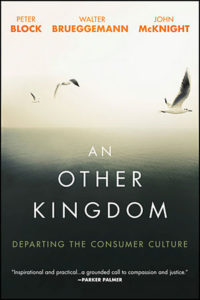 Bill Locke: What about the role of spirituality or faith? It seems to be permeating your work more as you get older. Your most recent book, An Other Kingdom: Departing the Consumer Culture, seems to be driven by something deeper. Where do you think that deeper spirit fits into the larger movement that you talk about – from consumerism to community?
Bill Locke: What about the role of spirituality or faith? It seems to be permeating your work more as you get older. Your most recent book, An Other Kingdom: Departing the Consumer Culture, seems to be driven by something deeper. Where do you think that deeper spirit fits into the larger movement that you talk about – from consumerism to community?
Peter Block: I think for me, faith has always been just a given. I haven’t been “religious”, and I’ve never been one who carried much hope. Sometimes I get too pessimistic, and I get angry, but I’ve always had faith – and I’ve always felt, well, there’s some reason we’re here. There’s some reason I’m here.
What happened with my writing is that Walter Brueggemann, an Old Testament scholar, found John and I. And the second thing that happened is that once I got interested in community, it was people of faith that showed up and offered the invitations – inviting me to come and do whatever I do. And so, being quite practical, I realized that most social movements, most real change, is going to come from the people who already have the language that’s needed. And we need the language of resurrection and renewal and forgiveness and jubilee and compassion and redemption. Those are very practical words. It seems to me they make all the sense in the world.
My only real regrets in life aren’t the mistakes that I’ve made, but the invitations that I’ve said “no” to because I was scared. I think sometimes people get nervous about the faith communities, about churches and Christians and about Jews , but I like the language of people of faith. And I do think the faith world is really intriguing – all sides of it, including Islam, which has an amazing history of generosity. And so I think we have all that history inside of us, and I don’t see how we can do anything without faith. So, I’ve become more expressive about that in recent years.
I think it’s woven together – faith, economics, geography, the common good, the land. We’re trying to find a way to make them one and the same thing. And that’s what you’re doing at Kolbe Times, too, I would say. You’re kind of holding them all in one space, and making them friendly to each other.
Bill Locke: That’s true. We’re trying to become a gathering place for people with different perspectives. We also want to encourage people to apply their faith and their beliefs, and take action – and to consider ways they could work together. If you were to suggest one or two simple things that people can do in their own world to bring about community, to connect people, what would those steps be?
Peter Block: I would say the simplest step is to take the view that whatever money you spend is a political act. For instance, try really hard to keep your dollars local, supporting locally-owned businesses. If you care about jobs, or people on the margins, it begins with being conscious about how you spend your money. That’s a simple act – but I would say that every dollar I spend is more powerful than the vote I’m going to make in the next election.
Another simple step is to invite strangers into your circle. Focusing on like-mindedness is an outcome of empire, and it’s killing us down here in the U.S. I think that many of you folks up in Canada perhaps have a different focus and way of being – I call it kindness. To me, being hospitable to strangers puts me in a space where I can still be surprised and be interested and have some vitality in my life.
I would also say to hold the idea that what you have is enough. I’ve been scared of being broke all my life, because I was broke in the beginning. But if I could just get it in my mind that I have enough, then I would show a bit more thoughtfulness about what I do with my money, and find some other things to do with it besides just going shopping. I think the areas of art and music and culture are extremely powerful. Artists are people who have the tools and capacity to connect us, and we need to support the arts with our extra dollars. Be an audience at least. I feel that supporting the arts is one of the most political and powerful things we can do, which is also why I appreciate your work at Kolbe Times, giving a voice to artists and a place where they can share their art. Journalism is really important, especially those who want to change the narrative. What you’re doing is a different kind of journalism. It’s beautiful.
Bill Locke: Well, we appreciate you dedicating a big chunk of your life to putting your thoughts about community together, and joining forces in your latest book with Walter Brueggemann and John McKnight. It’s a great example of community right there.
Peter Block: I know, who would have thought! I’m the youngest – I’m 78, Walter’s 82 and John is 85. So I sometimes say that we’re an example of intergenerational cooperation.
Bill Locke: I love that. Well, thanks again, Peter, for sharing your thoughts with us today, and more importantly, for opening your heart.
Peter Block: You’re very welcome. It’s been great talking with you.
Visit Peter Block’s website for more information and resources.
Peter is also involved in these initiatives, which we invite you to explore:
A Small Group
Restore Commons


